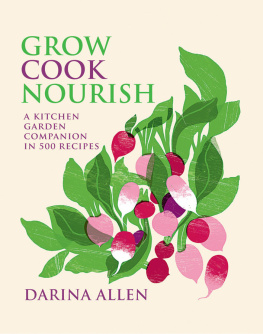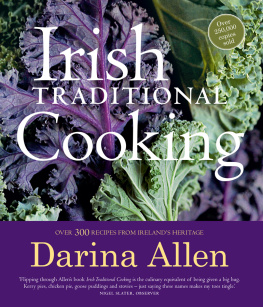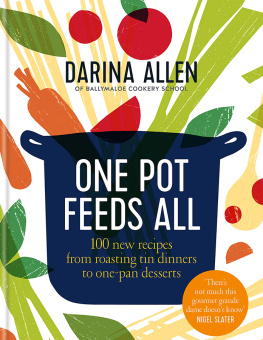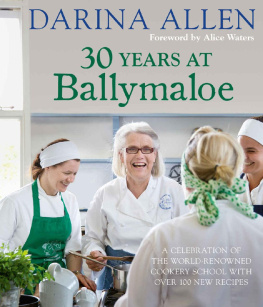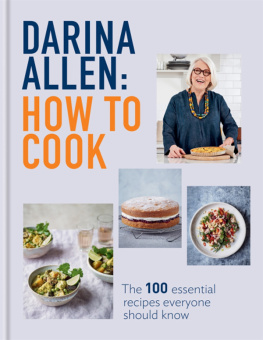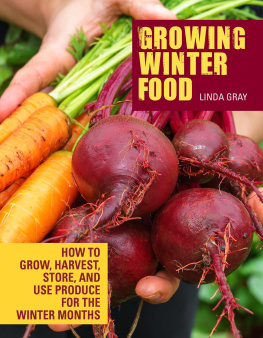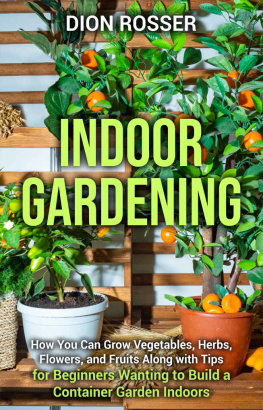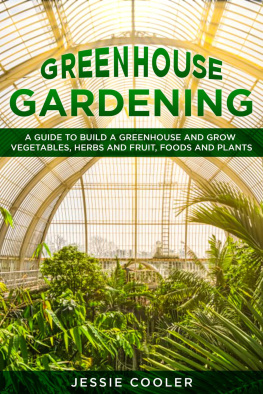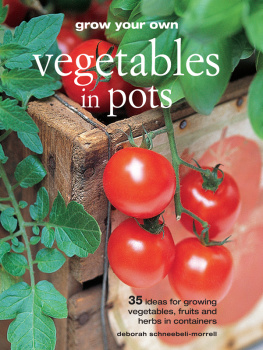GROW COOK NOURISH
DARINA ALLEN
Darina Allen is Irelands best-known food ambassador. She has run the world-renowned Ballymaloe Cookery School in Shanagarry, Co. Cork, situated in the middle of a 100-acre organic farm, since 1983.
She is the bestselling author of fifteen books, including 30 Years at Ballymaloe, Forgotten Skills of Cooking, which won the Andr Simon award in 2009, Irish Traditional Cooking, Ballymaloe Cookery Course and Healthy Gluten-free Eating (with Rosemary Kearney). Darina has presented nine series of her cookery programme, Simply Delicious, on television around the world and has written a weekly food column for the Irish Examiner since 1998.
Darina is a tireless campaigner for local produce. She founded the first farmers markets in Ireland, is on the board of The Soil Association and is one of the leaders of the Slow Food movement in Ireland. She is a natural teacher, whose enthusiasm and energy for good things is quite contagious, and has won many awards, including the Guild of Food Writers Lifetime Achievement award in 2013 for her incalculable contribution to culinary education.



CONTENTS


HOW TO USE THIS EBOOK
Select one of the chapters from the and you will be taken to a list of all the recipes covered in that chapter.
Alternatively, jump to the to browse recipes by ingredient.
Look out for linked text (which is in blue) throughout the ebook that you can select to help you navigate between related recipes.
You can double tap images to increase their size. To return to the original view, just tap the cross in the top left-hand corner of the screen.
INTRODUCTION
This is my sixteenth book and may just be the most important one I ever write. In the words of Lady Eve Balfour, founder of The Soil Association: The health of soil, plant, animal and man is one and indivisible.
The working title For Gods sake grow some of your own food and cook it sounded convincing when I said it with very deep passion as I always do, but on paper it looked preachy. And so Grow, Cook, Nourish came about. This encapsulates the entire process of sowing plants and seeds, nurturing them, harvesting, cooking and nourishing yourself and others.
When I was a child, people shopped every day. Some say the real turning point when our food became less nourishing was in 1979 when the first ready meal was sold in the supermarket and so began the start of the rise in allergies, food intolerances, obesity, type 2 diabetes I doubt that it is that simple but whatever the accumulated causes, there is no doubting that things have gone horribly wrong. We have gone from being a society who shopped for our fresh food and provisions on a daily basis, to one that has handed the power over our food choices to five or six multinational companies which can scarcely be expected to have our best interests, either our health or enjoyment of food, at heart. Their main responsibility is to their shareholders.
For most people with busy lives a one-stop shop at a supermarket once a week is the only choice, but not every society has chosen this option. France, Spain, Italy and many more European countries still shop daily at markets for their fresh produce far more than we do in the UK.
Since the 1950s, food producers have been encouraged to produce the maximum yield at the minimum cost. These days they are being forced by the cheap food policy in the retail trade and by the publics unrealistic assumption that inexpensive food is our right, to produce food below an economic level. It is quite simply impossible to produce wholesome food for the prices that farmers are now being paid. The result is an unmitigated disaster in health and socio-economic terms.
As a child in the 1950s and 60s we ate simple, nourishing food from our garden and the local area there were just three shops in our village and only a handful of processed foods. I cant quite remember when I first learned how to grow or even sow seeds. We always had a vegetable garden with apple trees, gooseberry and currant bushes, a few raspberry canes and a little row of strawberries that never seemed to produce very many berries. I never knew either of my grandmothers, as they died when I was very young, but both my grandfathers loved their vegetable gardens and orchards. Grandad, my paternal grandfather, designed quite elaborate formal gardens with long paths and many summer houses connecting the business and our house in the little village of Cullohill in Co Laois. There were lots of perennials, both fruit and vegetables, nothing particularly exotic because we didnt have a greenhouse but certainly enough to keep us plentifully supplied pretty much year round.
My maternal grandfather whom we called Granpoppy was a virtually self-sufficient farmer who also loved his garden. I dont remember the vegetable garden much but I do remember him being inordinately proud of his crop of Golden Wonder potatoes. There were pears, apples and plum trees in the orchard behind the haggard, and damsons and sloes in the hedgerows around the farm. Mummy also encouraged us to grow and allocated us little plots and part of the Rockery behind our house to grow both vegetables and flowers.
Later when I got married, despite the fact that we had a horticultural enterprise with acres of commercial greenhouses, a mushroom farm and extensive orchards, I was longing for my own little vegetable patch, so we cultivated a tiny plot close to the kitchen door and had the best fun planting it. After a few years, we designed the formal kitchen garden in the haggard. I was inspired by many potagers as well as the gardens at Villandry in the Loire Valley and by those of Robert Carrier at Hintlesham Hall in Suffolk.
Anyone can grow, anywhere, in any space. Even if you live in a skyscraper or a high-rise flat with a balcony, you can grow some of your own food. To grow, all you need is a seed, some soil or compost, light and water. You dont need green fingers, you dont even need a garden. You can grow on a windowsill, a balcony, in a few pots, tubs, baskets, in fact any kind of well-draining container. Obviously, the more space you have the more variety you can grow, but there can be an advantage in limited space because you are forced to be ingenious. Ive seen old drawers, rusty wheelbarrows, old chests and baths bursting with produce.
Gardening and growing is a lifetime of learning curves, every year a new adventure building on the previous years experience. Theres nothing like nature to put manners on us, one never knows it all. Every year there will be new challenges and a few successes, but from each disappointment and mistake we learn. Occasionally even a spectacular success or breakthrough will have you bursting with pride, and then theres the thrill of growing something new and exotic or an heirloom variety or a crop from the seeds weve saved ourselves.
A COOKS GARDEN
Im often asked if I came to gardening from being a cook, or vice-versa, but actually I realise that its neither. When I arrived at Ballymaloe House I discovered many exotic perennial vegetables such as seakale, globe and Jerusalem artichokes and cardoons, that are now my norm and I hope will also become yours.
Next page
